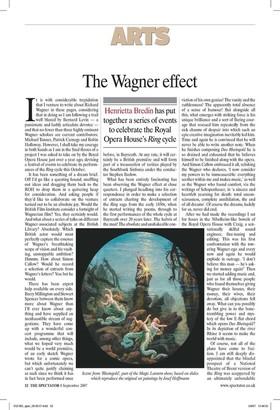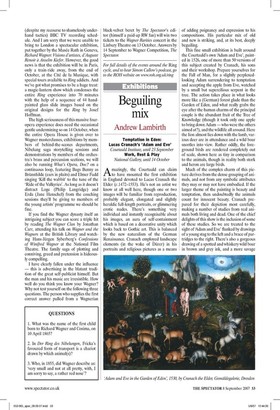The Wagner effect Henrietta Bredin has put togethe
The Wagner effect Henrietta Bredin has put together a series of events to celebrate the Royal Opera House's Ring cycle 1 t is with considerable trepidation that I venture to write about Richard Wagner in these pages, considering that in doing so I am following a trail well blazed by Bernard Levin — a passionate and lushly articulate devotee — and that no fewer than three highly eminent Wagner scholars are current contributors: Michael Tanner, Patrick Carnegy and Robin Holloway. However, I shall take my courage in both hands as I am in the final throes of a project I was asked to take on by the Royal Opera House just over a year ago, devising a festival of events to celebrate its performances of the Ring cycle this October.
It has been something of a dream brief. Off I'd go like a questing hound, snuffling out ideas and dragging them back to the ROH to drop them in a quivering heap for consideration. And asking people if they'd like to collaborate on the venture turned out to be an absolute joy. Would the British Film Institute consider a fortnight of Wagnerian film? Yes, they certainly would. And what about a series of talks on different Wagner-associated subjects at the British Library? Absolutely. Which British actor would most perfectly capture the essence of Wagner's breathtaking scope of vision and his vaulting, unstoppable ambition? Hmmm How about Simon Callow? Would he record a selection of extracts from Wagner's letters? You bet he would.
There has been expert help available on every side. Barry Millington and Stewart Spencer between them know more about Wagner than I'll ever know about anything and have supplied an inexhaustible stream of suggestions. They have come up with a wonderful concert programme that will include, among other things, what we hoped very much would be a world premiere, of an early sketch Wagner wrote for a comic opera, but which unfortunately we can't quite justify claiming as such since we think it has in fact been performed once before, in Bayreuth. At any rate, it will certainly be a British premiere and will form part of a treasurefest of rarities played by the Southbank Sinfonia under the conductor Stephen Barlow.
What has been entirely fascinating has been observing the Wagner effect at close quarters. I plunged headlong into his correspondence in order to make a selection of extracts charting the development of the Ring saga from the early 1850s, when he started writing the poems, through to the first performances of the whole cycle at Bayreuth over 20 years later. The hubris of the man! The absolute and unshakeable conviction of his own genius! The vanity and the ruthlessness! The apparently total absence of a sense of humour! But alongside all this, what emerges with striking force is his unique brilliance and a sort of flaring courage that rescued him repeatedly from the sick chasms of despair into which such an epic creative imagination inevitably led him Time and again he is convinced that he will never be able to write another note. When he finishes composing Das Rheingold he is so drained and exhausted that he believes himself to be finished along with the opera. And Simon Callow embraced it all, relishing the Wagner who declares, 'I now consider my powers to be immeasurable: everything seethes within me and makes music,' as well as the Wagner who found comfort, via the writings of Schopenhauer, in 'a sincere and heartfelt yearning for death: total unconsciousness, complete annihilation, the end of all dreams'. Of course the dreams, luckily for us, never did end.
After we had made the recordings I sat for hours in the Nibelheim-like bowels of the Royal Opera House with Craig, a sensationally skilful sound engineer, fine-tuning and editing. This was his first confrontation with the towering Wagner-ego and every now and again he would explode in outrage. 'I don't believe this man — he's asking for money again!' Then we started adding music and, just as for all those people who found themselves giving Wagner their houses, their money, their wives, their devotion, all objections fell away. What can you possibly do but give in to the bonetrembling power and mystery of the low E-flat chord which opens Das Rheingold? In its depiction of the river Rhine it seems to make the world with music.
Of course, not all of the plans have come to fruition. I am still deeply disappointed that the blissful prospect of a National Theatre of Brent version of the Ring was scuppered by an ultimately unbendable (despite my recourse to shamelessly underhand tactics) BBC TV recording schedule. And I am sorry that we were unable to bring to London a spectacular exhibition, put together by the Musee Rath in Geneva, Richard Wagner: Visions d'artistes, d'Auguste Renoir a Anselm Kiefer. However, the good news is that the exhibition will be in Paris, only a train-ride away, from the end of October, at the Cite de la Musique, with special tours available to Ring addicts. And we've got what promises to be a huge treat: a magic-lantern show which condenses the entire Ring experience into 70 minutes with the help of a sequence of 44 handpainted glass slide images based on the original designs for the Ring by Josef Hoffman.
The high seriousness of this massive fouropera experience does need the occasional gentle undermining so on 14 October, when the entire Opera House is given over to Wagner masterclasses, exhibitions by members of behind-the-scenes departments, Nibelung saga storytelling sessions and demonstrations by members of the orchestra's brass and percussion sections, we will also be running What's Opera, Doc? on a continuous loop, featuring Bugs Bunny as Brannhilde (ears in plaits) and Elmer Fudd singing 'Kill the wabbit' to the tune of the 'Ride of the Valkyries'. As long as it doesn't distract Loge (Philip Langridge) and Erda (Jane Henschel) from the coaching sessions they'll be giving to members of the young artists' programme we should be fine.
If you find the Wagner dynasty itself an intriguing subject you can score a triple hit by reading The Wagner Clan by Jonathan Carr, attending his talk on Wagner and the Wagners at the British Library and watching Hans-Jurgen Syberberg's Confessions of Winifred Wagner at the National Film Theatre. The family saga of plotting and conniving, greed and pretension is hideously compelling.
I have clearly fallen under the influence — this is advertising in the blatant tradi- tion of the great self-publicist himself. But the man and his music are irresistible. How well do you think you know your Wagner? Why not test yourself on the following three questions. The person who supplies the first correct answer pulled from a Wagnerian black-velvet beret by The Spectator's edi- tor (himself a paid-up RW fan) will win two tickets to the Wagner Rarities concert in the Linbury Theatre on 13 October. Answers by 14 September to Wagner Competition, The Spectator For full details of the events around the Ring cycle, and to hear Simon Callow's podcast, go to the ROH website on www.roh.org.uktring




































































 Previous page
Previous page